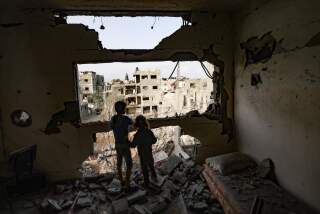He Needs More Than a Dad’s Love
- Share via
When my son and his California National Guard unit were sent to Iraq, I thought about hanging a yellow ribbon in front of my house. “Support the troops” has a different meaning when your kid is one of them. I could not decide if hanging the ribbon by the door was supporting him or supporting the war. Eventually, I decided not to; I didn’t see what good it would do.
He and his comrades need all the support they can get, but not in the form of ribbons. He needs support from the people who sent him there. In the months since he has been in Iraq, he has repeatedly mentioned a shortage of ammunition and gun lubricants in his letters home.
This comes on top of his concern that he and his fellow soldiers were inadequately trained for what they are dealing with in Iraq. He writes of too little time on the firing range honing combat skills, lack of preparation for urban warfare and equipment ill suited for their mission. When it comes to guns, bullets and such, a parent has no support to give.
But it’s not just equipment and training. Judging from my son’s letters, the soldiers are often short of everyday items of every sort. Lip balm against the desert winds, sunscreen, socks and T-shirts are on the list. He asks for dried fruits, nuts, canned meat, razors, shaving cream and snuff, which he does not use but says is valuable for bartering. The list is long, but sending the items on it is the only way his family has found to support its trooper.
He writes that many of his fellow soldiers do not have family or friends for this kind of support. I’ve mentioned this to people and I am touched at the number who have been sending monthly packages to soldiers they know only through my son.
He and his friends are grateful -- not only for the food and toiletries but for knowing they are not forgotten. This is a little war, and as time goes on, it and the names of the fallen float toward the bottom of the news. As one of my son’s buddies has written, “The thing is, people are still dying. But now we are dying in garrison. We are sitting and waiting for the next rocket to land on our heads. We take losses, but nothing is gained. So what now?”
I don’t know. In his letters, my son steers clear of the big picture: He doesn’t say much about the overall war, and he doesn’t generalize about morale. He says that the big events of the day that catch our attention here at home are far-away flashes.
A letter written home by a soldier friend of his suggests something similar: “Anything that happened before the last time one of your brothers (or sisters ) in arms was killed in action is old news. Anything that happened before the last time you personally were called on to give your life for your country and are still alive not because you didn’t answer the call, but because the bullets missed (this time), is old news. Around here, news gets old pretty fast.”
Like all parents, I still see my son as a little boy whom I read Dr. Seuss to, the child whom we tried to protect from ugliness and evil, the youngster whose eyes saw only what was right and happy with the world. Those eyes have now seen indescribable events, and to the extent I am able, I support him in having to bear those experiences.
My son was called up and sent overseas for the 1991 Persian Gulf War. Since then he has gotten married and become a middle-aged man, like so many guardsmen. His service is a great hardship for him and his family, but he does not complain, though he knows how unequally the sacrifices for this dubious combat have been apportioned. He does his soldier’s duty and I support him in that, even as I try to decide if it is worse to turn on the news or keep it off. Either way, those of us who love him think about him all the time, and for now that is the only support we have to give.
*
Nicholas Von Hoffman is a columnist for the New York Observer and is the author, most recently, of “Hoax” (Nation Books, 2004).


